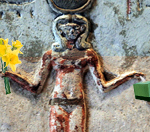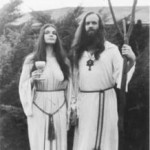For the last six months or so, I’ve been working on a new site, called Neo-Paganism.org (mirror site: ProgressivePaganism.com), which is intended to serve as an introduction to Neo-Paganism. There’s about a hundred pages of writing on Neo-Pagan identity, beliefs, practices, and history there. You can check it out the site map here.
The site is in the Beta-testing phase. The comments feature on each page on the site will be open for a fixed period of time (yet to be determined) in order to allow interested parties to give helpful suggestions for improving the site and the accuracy and comprehensiveness of the content. I won’t be responding to comments, but I will read them all and take them into consideration. (As always, I reserve the right to delete any comments that are of an inflammatory or harassing nature or otherwise do not contribute to a constructive debate.)
Neo-Paganism.org represents an attempt to outline a distinctly Neo-Paganism, which is distinct from both devotional and reconstructionist polytheisms and from traditional esoteric witchcraft. I’ve been ambivalent about this project for a while, but I was spurred to bring it to (near-)completion by several factors. The first was the growing consensus that the word “Pagan” is an “umbrella term” for a variety of related but distinct religious movements. While I think this usage is a good thing, as it promotes solidarity among these diverse religious groups, it poses a problem for individuals like me who identify primarily as “Pagan”, i.e., individuals who identify first and foremost as “Pagan”, not as witches, Wiccans, druids, polytheists, or anything else. As “Pagan” is used increasingly as an umbrella term, some of us are left without a name to call our own. “Neo-Pagan” was the term originally used for us (coined by Oberon Zell), and like Phaedra Bonewits, I would like to see the term reclaimed .
The second factor was a number of comments I have received on this blog from hard polytheists and others who perceive Neo-Paganism as spiritually shallow, or in the words of a recent commenter, “any feel-good groovy non-misogynist nature friendly New Age claptrap that anyone wants to label as ‘Pagan.'” I am bothered by such dismissive characterizations of what to me is a rich and profound religious tradition. I believe Neo-Paganism has its own depths and its own mysteries which go beyond the familiar rituals which are performed at public pan-Pagan events like Pagan Pride Day and CUUPS events. Neo-Paganism is not generic Paganism or watered-down Wicca. It is not an exoteric periphery to an esoteric witchcraft. Neo-Paganism is its own thing. It is a religious tradition in its own right, albeit one that is eclectic and evolving.
The third factor was the publication of John Sulak’s The Wizard and the Witch: Seven Decades of Counterculture, Magick & Paganism this year, which helped to validate my understanding that Neo-Paganism has a history of its own. This quote by Oberon Zell in particular caught my attention:
“… we stopped off in Philadelphia, where we met a couple who had just started up a Pagan Way group, based on liturgy created by Ed Fitch. They wanted to create a Wiccan tradition that would be publicly accessible. It would be sort of like an “outer court” for Witchcraft. But it was an unfortunate choice of name. People who joined the Pagan Way thought of themselves as generic Pagans, but what they were really being considered by the organization was proto-Witches. If they continued on, they would eventually get initiated into Witchcraft. So the idea became embedded in the community that Pagans were simply proto-Witches who hadn’t got initiated yet. The notion that was promoted was that Witches were the clergy, and the Pagans were the laity. Which was really annoying to Pagan groups, who had their own distinct traditions! We still run into this unfortunate attitude among some Witches.
“We were really surprised to lean that these lovely folks didn’t include their kids in their religious practice. It wasn’t a family thing for them, as it was for us in CAW [Church of All Worlds]. There were sending their children to Christian Sunday schools. And when they would have their full-moon Esbat Circles, they would have their kids taken care of by a babysitter, and the kids would never know what they were doing. We thought that was weird. For us, Paganism was a religion which included everybody. They were thinking of it more as a lodge or a secret society like the Masons. We hadn’t assimilated that that’s where a lot of people were coming from until that trip, because we had developed all this stuff on our own over the years, with practically no real connection with Witches.
“Today many folks think that Witches founded the Pagan community, but it wasn’t that way at all–at least not in the United States. Here the witches came into a Pagan community that had already existed for at least a decade. What a lot of my work was engaged in at the time was weaving together some of these different threads. I worked hard to do that by the publishing of Green Egg, which went out to all of these different groups. THe Pagan community today has roots in what were at that time very separate communities.”
(emphasis added)
Neo-Paganism.org represents my attempt to outline the nature, beliefs, practices, and history of Neo-Paganism for the general public. Considering how upset some people got at my previous post, “(Neo-)Paganism is Paradox”, I suspect that this endeavor will attract a lot of detractors. I recognize that some people who identify as Neo-Pagan may feel that they are misrepresented by this site, and I invite them to share their comments so the site can be improved. There will likely also be some people who are just opposed to any attempt to “define” Neo-Paganism. Nevertheless, I continue to feel that there is value in both attempting to descibe (but not necessarily circumscribe) Neo-Paganism, and to distinguish it from related forms of Paganism, including the more esoteric forms of witchcraft and the more devotional and reconstructionist forms of polytheism.
Please come by and check it out.















